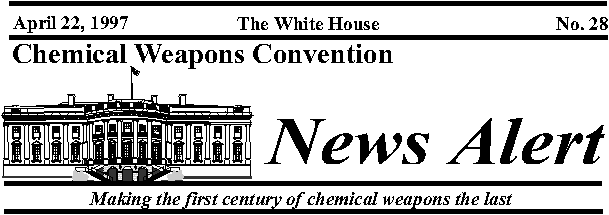On the eve of the Chemical Weapons Convention debate, the Administration and Majority
Leader Lott have gone the extra mile to reach agreement on 28 conditions that will be included
in the treaty�s resolution of ratification. Among them are binding commitments to maintain
strong defenses against chemical attack; toughen enforcement; allow the use of riot control
agents like tear gas in a wide range of military and law enforcement situations; and require
search warrants for any involuntary inspections of an American business.
These agreed-upon conditions resolve virtually all of the issues that have been raised
about this treaty. But there are still a handful of issues on which the Administration and
some in the Senate still disagree. At stake on these remaining issues is the treaty itself.
Killer Amendment #1: Russia Must Join First
(Resolution of Ratification Condition #29)
That is precisely backwards. The best way to secure Russian ratification is to ratify
the treaty ourselves. Failure to do so will only give hard-liners in Russia an excuse to
hold out and hold on to their chemical weapons.
Killer Amendment #2: Rogue States Must Join
First
(Resolution of Ratification #30)
No country, especially an outlaw state, should
have a veto over our national security. Prohibiting the U.S. from joining until Libya and
Iran join will make us weaker, not stronger, in our fight to prevent rogue states from
developing chemical weapons. We would lose the ability to use and enforce the treaty�s
tough trade restrictions and inspection tools.
Killer Amendment #3: Barring Inspectors
(Resolution of Ratification #31)
Adoption of this condition would most likely result in other nations blackballing all
American inspectors in advance. The CWC already provides the U.S. Government the right to
bar inspectors, just as defense attorneys can peremptorily challenge a prospective juror in
a trial. This meat ax approach will almost certainly provoke reciprocity.
Killer Amendment #4: Article X and XI
(Resolution of Ratification Condition #32)
Opponents would force us to reopen negotiations on the CWC to try and fix two concerns
that have already been resolved. Their interpretation of treaty language flies in the face
of the treaty�s language and intent.
First, under Article X, which provides for the
|
exchange between parties of defensive materials,
only countries that have joined the CWC, renounced chemical weapons and destroyed their
stockpiles can request assistance -- and only if they are threatened or attacked with
chemical weapons. To emphasize this point, President Clinton has committed that under
Article X, the U.S. will limit defensive assistance to countries such as Iran or Cuba,
should they ratify and comply with the treaty, to emergency medical supplies.
Second, Article XI in no way forces parties to the treaty to spread chemical weapons
technology, as some treaty opponents allege. It would be strange indeed if a treaty
expressly aimed at eliminating chemical weapons caused their proliferation -- and it would
be wrong. The President has committed that neither we nor our allies share this bizarre
interpretation, and that we will certify annually that the United States and our allies
continue to maintain equally effective or more comprehensive controls over chemical weapons
material.
Killer Amendment #5: Verification
(Resolution of Ratification Condition #33)
This killer condition imposes an unrealistically high standard of verification. There is
no such thing as perfect verifiability in a treaty, but this treaty�s tough monitoring,
reporting, and on-site inspection requirements will enable us to detect militarily
significant cheating. Our soldiers on the battlefield will be safer. That, clearly, is
an advance over no treaty at all.
If the Senate approves these �killer conditions,� it will mean foregoing this treaty�s
clear benefits and incurring some clear -- and painful -- costs. We will be denied use
of the treaty�s tools against rogue states and terrorists. We will lose the chance to
implement and enforce the rules we helped make, or to have Americans serve as international
inspectors. We will subject our chemical companies -- among our leading exporters -- to
trade restrictions that will cost them both sales and jobs. And we will send an
unmistakable signal of retreat that will undermine our leadership to stop the spread of
weapons of mass destruction.
That must not be allowed to happen. While the CWC is not a panacea, it represents a
real opportunity to strengthen the global fight against a threat that no one nation can meet
on its own. That is why Presidents and legislators from both parties and every Chairman of
the Joint Chiefs of Staff for the past 20 years have made U.S. approval their common
cause. |


